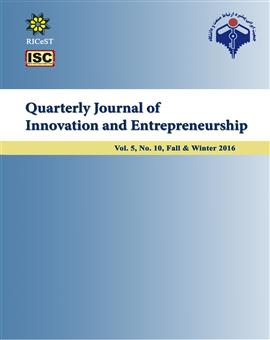Identification and Analysis on Systemic failures of Iranian National Innovation System
Subject Areas : General
jafar bagherinejad
1
*
![]() ,
ahmadreza kasraei
2
,
hooman farshad
3
,
ahmadreza kasraei
2
,
hooman farshad
3
1 - Faculty of Engineering, Alzahra University, Tehran, Iran
2 -
3 -
Keywords: National Innovation System, Systemic Problems, Innovation Policy, Structural Equation Modeling,
Abstract :
National innovation system(NIS) includes a series of organizations and institutions at the national level which aims to incorporate in developing and diffusion of science and technology and creates innovation climate. Governments in this system develop and implement their innovation policy. In systemic approach besides problems of each elements of this system ,there is another failure which related to interactions of the system elements, that is called systemic failure. In this research , at first by reviewing the literature conceptual framework of national innovation system of Iran is presented. Then, in a field study by distribution of 350 questionnaires among Iranian innovation experts and specialists and using structural equation modeling technique , analyzing of interactions and their impacts on each other and effectiveness of national innovation system has been done. In this research, the elements of NIS of Iran consists of strategies of transfer and diffusion of technology, structural elements, innovation drivers and legislations frameworks. Findings of this research show that the most important systemic failure of NIS of Iran is lack of effectiveness of legislations frameworks’ impacts on innovation drivers. Identification and analysis of systemic failures can lead to appropriate policies for each elements and at last upgrade the performance of national innovation system.
1. انصاری، رضا، 1392، بررسی و تبیین سازمانهای پژوهش و فناوری در نظام ملی نوآوری ایران، رشد فناوری، شماره ۳۷، صص 21-13
2. باقری نژاد، جعفر، میرکاظمی ، محمد ، 1394 ، تحلیل سیاست علم، فناوری ونوآوری در ایران ، انتشارات ارنا- اسفند 94
3. باقری نژاد، جعفر، 1382، سیستم نوآوری ملی بستر مناسب توسعه فناوری، مجموعه مقالات هفتمین کنگره سراسری همکاریهای دولت، دانشگاه و صنعت برای توسعه ملی، صص 263- 251
4. بیتعب، علی، 1392، مدلی برای ارزیابی توانمندی نوآوری در سطح ملی، فصلنامه مدیریت توسعه فناوری، شماره ۲. صص 29-3
5. حافظ نیا، محمدرضا، 1382، مقدمهای بر روش تحقیق در علوم انسانی، تهران، سازمان مطالعه و تدوین کتب علوم انسانی دانشگاهی (سمت)، چاپ هشتم
6. سرمد و همکاران، 1388،روشهای تحقیق در علوم رفتاری. تهران: نشرآگه
7. سلطانی، بهزاد،بیرنگ، علی مرتضی، 1382، پارکها و مراکز رشد در نظام ملی نوآوری، هفتمین کنگره سراسری همکاریهای دولت، دانشگاه و صنعت برای توسعه ملی
8. شوماخر، رندال، لومکس، ریچارد، 1388، مقدمهای بر مدلسازی معادله ساختاری، ترجمه وحید قاسمی، انتشارات تهران
9. قاضی نوری، سید سپهر و قاضی نوری، سید سروش، 1387، استخراج راهکارهای اصلاح نظام ملی نوآوری ایران با تکیه بر مطالعه تطبیقی کشورهای منتخب، فصلنامه سیاست علم و فناوری، 1(1)،صص.64-80
10. محمدی، مهدی؛ الیاسی، مهدی، 1392، تحلیل مدل شکل گیری کارکردهای نظام نوآوری فناورانه نوظهور در ایران، فصلنامه سیاست علم و فناوری، سال پنجم، شماره ۴
11. ملکی فر، تقوی، ارگاس، هنری، 1377، بررسی تطبیقی سیاستهای کلان تکنولوژی و نظامهای پژوهشی آموزشی در کشورهای عمده صنعتی، مؤسسه آموزشی و تحقیقاتی صنایع دفاعی
12. منطقی، منوچهر، حسنی، علی و بوشهری، علیرضا، 1388، شناسایی چالشهای سیاستگذاری در نظام ملی نوآوری ایران، فصلنامه سیاست علم و فناوری، 2 (3)، صص. 87-102
13. وحید، مجید، 1384، نگاهی به مشکل سیاستگذاری عمومی در ایران در قالب جامعه شناسی سازمانها و با بهره گیری مفهوم مرجعیت، مجله حقوق و علوم سیاسی، شماره 69
14.Arnold, E., Bell, M., Bessant, J., Brimble, P., 2000. Enhancing Policy and Institutional Support for Industrial Technology Development in Thailand: The Overall Policy Framework and the Development of the Industrial Innovation System. World Bank, US
15.Atkinson, R.D (2014) “ Understanding the US National Innovation System”. The Information Technology and Innovation Foundation, Washington
16.Baldwin, J., Lin, Z., 2002. Impediments to advanced technology adoption for Canadian manufacturers. Research Policy 31, 1–18
17.Bell, M., 2002. Knowledge resources, innovation capabilities and sustained competitiveness in Thailand: transforming policy processes. Report of the project Thailand: National Science and Technology Policy Capacity. SPRU, Sussex University, Mimeo
18.Bokovic, Tomislav ( 2010 ) " Managing innovation systems in transition economies”. WORKING PAPER SERIES. Paper No. 10-01. Faculty of Economics and Business, University of Zagreb
19.Borrás, S., Chaminade, C., Edquist, E., 2009. The challenges of globalisation: strategic choices for systems of innovation. In: Marklund, G. (Ed.), The Innovation Imperative – Globalization and National Competitiveness. VINNOVA
20.Carlsson, B., Jacobsson, S., 1997. Diversity creation and technological systems: a technology policy perspective. In: Edquist, C. (Ed.), Systems of Innovation: Technologies, Institutions and Organizations. Pinter Publishers, London
21.Chalamwong, Y., et al., 2007. A study on application pattern of human resource development plan for demand in industrial sector. A final report submitted to Department of industrial economics, Ministry of Industry, April (in Thai)
22.Kline, R.B. (2005), Principles and Practice of Structural Equation Modeling (2nd Edition ed.). New York: The Guilford Press
23.Lee, keyoung-Ae (2007) “An analysis on system failure mechanism of sectoral systems of Innovation(SIS)”.school of IT Business
24.Mark Dodgson et al (2010) “Systems thinking, market failure, and the development of innovation policy- The case of Australia”. Research Policy · January 2010, DOI: 10.1016/j.respol.2011.05.015
25.Metcalfe, J.S., 1995b. The economic foundations of technology policy: equilibrium and evolutionary perspectives. In: Stoneman, P. (Ed.), Handbook of the Economics of Innovation and Technological Change. Blackwell, Oxford
26.Ricard, L.M. (2015) “ Coping with system failure: Why connectivity matters to innovation policy”. Roskilde University, Denmark. Springer international publishing Switzerland 2015
27.Schrempf, B. , Kaplan,D. and Schroeder, D. (2013) “ National, regional and sectoral systems of Innovation; an overview”. Report for FP7 project “ progress”. European commission seventh framework program, Progress
28.Smith, K., 2000. Innovation as a systemic phenomenon: rethinking the role of policy. Enterprise and Innovation Management Studies 1, 73–102

